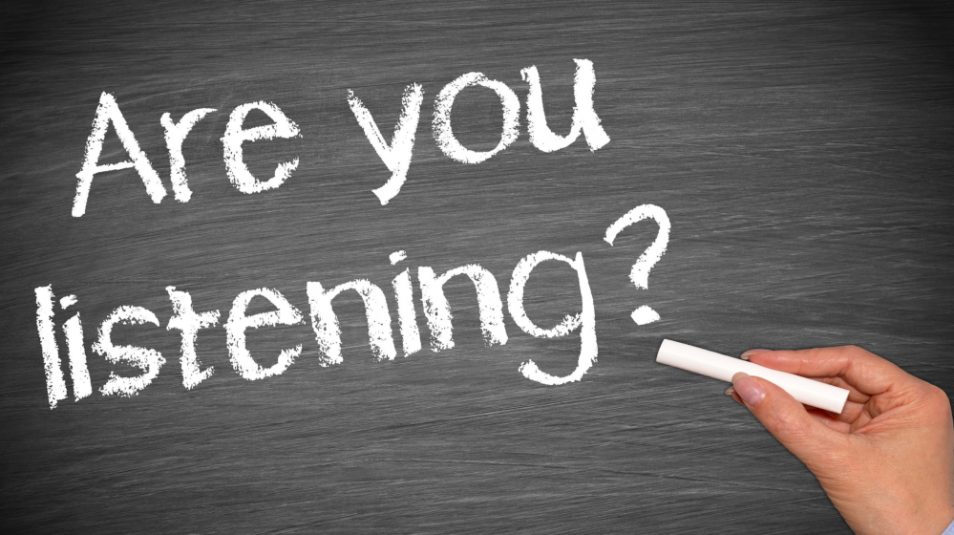Are You Listening?

Personal Development
April 26, 2019
David Nielson
Topics
collaboration, Communication, connection, Listening, respectfulTo truly “seek to understand” someone, you have to slip into that person’s frame of reference. This includes understanding the person’s values, experience, knowledge, and emotion. You have to understand the elements of the other person, how the person ticks. You must try to climb into the person’s head and experience the world as he or she does.
The best way to get into someone else’s frame of reference is to listen.
There is a difference between hearing someone speak and listening to someone speak. Determining the difference is often a challenge in marriages. For example, a husband may nod his head and say affirming words while his wife is talking, but when she stops talking and he looks at her face, her expression says, “I just asked you a question and I am waiting for an answer.” The husband hits rewind on his internal tape to try to remember what his wife just said twenty seconds prior. No good. He was hearing her talk, but he had not truly listened and absorbed what she said. So the only logical thing for him to say is something like, “Could you say that again?” Of course, at this point he’s doomed.
Or maybe you’ve sat through a two-hour meeting, and then the boss turns to the person next to you and asks the dreaded question, “So what do you think?” If the guy was passively listening, sweat will begin to glisten on his brow, and he might stutter something like, “Well…I, uh…don’t know. I’ll have to think about that. I’ll get back to you later.” What everyone else in the room hears him say: “I was thinking about lunch and whether I should clean my garage this weekend. I have no idea what you were saying, because it really is not that important to me. So instead of admitting I was tuning you out, I’m going to make up a lame response to woefully cover my tracks.”
Think about interactions you have had in the recent past with any number of people or even some you’ve witnessed. I bet you can think of times when the conversation clearly felt or looked out of sync. Two people were talking, some information might have been exchanged, but they were not really communicating— not really connecting.
Basic, focused connection is critical to successful, respectful relationships.
It is also quite critical to accomplishing tasks with other individuals—it’s crucial for effective collaboration.
Think of one or two very successful (in business and life) individuals you’ve witnessed/ admired in your career. What two or three questions or personality traits in those successful individuals do you believe most contributed to their success? The most common answer to this question is: They are great listeners. But what does that mean? What are the essential parts of being a great listener?
For years, I have used a simple definition for effective communication: When a sender sends information to an intended receiver, and the intended receiver hears and understands the information in the way the sender intended. This definition is elegant in its simplicity. However, it is somewhat fragile when you consider all the elements and realize that if even one of the elements is missing, effective communication will not occur. You can see that both people are responsible for the outcome. Learning to pay attention starts with a profoundly simple behavior—listening! It’s a simple idea in short supply in many settings. I don’t mean pretending to listen. I mean genuinely listening. And I mean listening for full meaning of the speaker’s message.
You have probably been in conversations where a lot of people are talking, and you wonder if a message or information is actually being heard and received. In my workshops, I often ask, “Is listening an observable behavior?” Easily more than 95 percent of the people answer, “Yes.” Then I ask, “What does listening look like?” Common answers are: “People have wide, open eyes and maintain eye contact. They lean forward, and nod their heads.” And I then ask, “What is the acid test that real listening actually occurred?” Very few people easily answered this, yet the answer is fairly simple: You know people have listened to you if they can demonstrate they heard.
This is so important because in the process of a dialog or conversation, listening is not truly an observable behavior. Considering the common listening behavior answers I receive (wide open eyes, maintain eye contact, lean forward, and nodding heads), can you demonstrate those behaviors without actually listening? Of course you can, and many often do.
Bottom Line: Active listening accelerates communication and understanding. By doing it well you can build trust and demonstrate respect for others. So what about it - are you actually listening?






Great insight and wisdom. It seems so simple, yet information like this opens my eyes to be more intentional! Thank you!